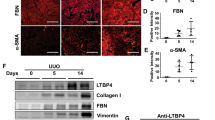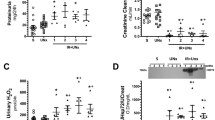Abstract
Aim:
Recent information indicates that pentoxifylline (PTX) has the ability to suppress inflammation and profibrotic cell proliferation. In this study, we investigated the effect of PTX on tubulointerstitial fibrosis and the expression of vascular endothelial growth factor (VEGF) in a rat model of obstructive nephropathy.
Methods:
Wistar rats with left ureteral ligation were divided into control and PTX-treated groups. The histopathologic degree of tubulointerstitial fibrosis was scored with PAS and Masson-stained sections. The protein and mRNA for vascular endothelial growth factor (VEGF) were semiquantitatively measured with immunohistochemistry and RT-PCR. The protein for transforming growth factor β1 (TGFβ1) and hypoxia-induced factor 1 alpha (HIF-1α) was determined by Western blot.
Results:
Compared with the control group, PTX treatment reduced fibrosis scores at d 7 and d 14 (P<0.05). The reduction was accompanied by inhibited expression of transforming growth factor-beta 1 (TGFβ1), a key cytokine in tubulointerstitial fibrogenesis (P<0.01). Meanwhile, VEGF protein and mRNA in the kidney were increased in the PTX-treated group compared with the control group (P<0.01). PTX up-regulated expression of VEGF mRNA in a dose- and time-dependent manner in cultured HK-2 cells (P<0.01). However, expression of HIF-1α (a key transcription factor for VEGF gene expression) was unchanged by PTX treatment. PTX prolonged the half-life of VEGF mRNA by a 1.07-fold increase.
Conclusions:
PTX inhibited tubulointerstitial fibrosis in a rat model of obstructive nephropathy while preventing loss of VEGF. PTX up-regulated expression of VEGF mRNA through stabilization of its mRNA in cultured renal tubular epithelial cells.
Similar content being viewed by others
Log in or create a free account to read this content
Gain free access to this article, as well as selected content from this journal and more on nature.com
or
References
Damico G, Ferrario F, Rastaldi MP. Tubulointerstitial damage in glomerular disease: its role in the progression of renal damage. Am J Kidney Dis 1995; 26: 124–32.
Kang DH, Kanellis J, Hugo C, Truong L, Anderson S, Kerjaschki D, et al. Role of the microvascular endothelium in progressive renal disease. J Am Soc Nephrol 2002; 13: 806–16.
Nangaku M. Chronic hypoxia and tubulointerstitial injury: A final common pathway to end-stage renal failure. J Am Soc Nephrol 2006; 17: 17–25.
Choi YJ, Chakraborty S, Nguyen V, Nguyen C, Kim BK, Shim SI, et al. Peritubular capillary loss is associated with chronic tubulointerstitial injury in human kidney: Altered expression of vascular endothelial growth factor. Hum Pathol 2000; 31: 1491–7.
Ohashi R, Kitamura H, Yamanaka N. Peritubular capillary injury during the progression of experimental glomerulonephritis in rats. J Am Soc Nephrol 2000; 11: 47–56.
Yuan HT, Li XZ, Pitera JE, Long DA, Woolf AS. Peritubular capillary loss after mouse acute nephrotoxicity correlates with down-regulation of vascular endothelial growth factor-A and hypoxia-inducible factor-1alpha. Am J Pathol 2003; 163: 2289–301.
Ohashi R, Shimizu A, Masuda Y, Kitamura H, Ishizaki M, Sugisaki Y, et al. Peritubular capillary regression during the progression of experimental obstructive nephropathy. J Am Soc Nephrol 2002; 13: 1795–805.
Zhang B, Liang X, Shi W, Ye Z, He C, Hu X, Liu S . Role of impaired peritubular capillary and hypoxia in progressive interstitial fibrosis after 5/6 subtotal nephrectomy of rats. Nephrology (Carlton) 2005; 10: 351–7.
Kang DH, Hughes J, Mazzali M, Schreiner GF, Johnson RJ. Impaired angiogenesis in the remnant kidney model: II. Vascular endothelial growth factor administration reduces renal fibrosis and stabilizes renal function. J Am Soc Nephrol 2001; 12: 1448–57.
Ferrara N. Molecular and biological properties of vascular endothelial growth factor. L Mol Med 1999; 77: 527–43.
Zelzer E, Levy Y, Kahana C, Shilo BZ, Rubinstein M, Cohen B. Insulin induces transcription of target genes through the hypoxia-inducible factor HIF-1α/ARNT. EMBO J 1998; 17: 5085–94.
Pillebout E, Burtin M, Yuan HT, Briand P, Woolf AS, Friedlander G, et al. Proliferation and remodeling of the peritubular microcirculation after nephron reduction: Association with the progression of renal lesions. Am J Pathol 2001; 159: 547–60.
Turo A, Norwood VF, Carey RM, Gomez RA. Vascular endothelial growth factor induces nephrogenesis and vasculogenesis. J Am Soc Nephrol 1999; 10: 2125–34.
Villegas G, Lange-Sperandio B, Tufro A. Autocrine and paracrine functions of vascular endothelial growth factor (VEGF) in renal tubular epithelial cells. Kidney Int 2005; 67: 449–57.
Kanellis J, Fraser S, Katerelos M, Power DA . Vascular endothelial growth factor is a survival factor for renal tubular epithelial cells. Am J Physiol Renal Physiol 2000; 278: F905–15.
Advani A, Kelly DJ, Advani SL, Cox AJ, Thai K, Zhang Y, et al. Role of VEGF in maintaining renal structure and function under normotensive and hypertensive conditions. Proc Natl Acad Sci USA 2007; 104: 14448–53.
Magnusson M, Gunnarsson M, Berntorp E, Björkman S, Höglund P. Effects of pentoxifylline and its metabolites on platelet aggregation in whole blood from healthy humans. Eur J Pharmacol 2008; 581: 290–5.
Hernández E, Correa A, Bucio L, Souza V, Kershenobich D, Gutiérrez-Ruiz MC. Pentoxifylline diminished acetaldehyde-induced collagen production in hepatic stellate cells by decreasing interleukin-6 expression. Pharmacol Res 2002; 46: 435–43.
Hewitson TD, Martic M, Kelynack KJ, Pedagogos E, Becker GJ. Pentoxifylline reduces in vitro renal myofibroblast proliferation and collagen secretion. Am J Nephrol 2000; 20: 82–8.
Chen YM, Chien CT, Hu-Tsai MI, Wu KD, Tsai CC, Wu MS, et al. Pentoxifylline attenuates experimental mesangial proliferative glomerulonephritis. Kidney Int 1999; 56: 932–43.
Lin SL, Chen YM, Chien CT, Chiang WC, Tsai CC, Tsai TJ. Pentoxifylline attenuated the renal disease progression in rats with remnant kidney. J Am Soc Nephrol 2002; 13: 2916–29.
Ramesh G, Reeves WB. TNF-α mediates chemokine and cytokine expression and renal injury in cisplatin nephrotoxicity. J Clin Invest 2002; 110: 835–42.
Zhou QG, Zheng FL, Wen YB, Tan XY, Duan L, Li Y. Altered expression of vascular endothelial growth factor and its receptors in transdifferentiated human proximal tubular epithelial cells induced by transforming growth factor beta1. Zhongguo Yi Xue Ke Xue Yuan Xue Bao 2005; 27: 325–31. (Chinese).
Kim BS, Chen J, Weinstein T, Noiri E, Goligorsky MS. VEGF expression in hypoxia and hyperglycemia: reciprocal effect on branching angiogenesis in epithelial-endothelial co-cultures. J Am Soc Nephrol 2002; 13: 2027–36.
Du M, Roy KM, Zhong L, Shen Z, Meyers HE, Nichols RC. VEGF gene expression is regulated post-transcriptionally in macrophages. FEBS J 2006; 273: 732–45.
Bottinger EP, Bitzer M. TGF-β signaling in renal disease. J Am Soc Nephrol 2002; 13: 2600–10.
Lin SL, Chen RH, Chen YM, Chiang WC, Lai CF, Wu KD, et al. Pentoxifylline attenuates tubulointerstitial fibrosis by blocking smad3/4-activated transcription and profibrogenic effects of connective tissue growth factor. J Am Soc Nephrol 2005; 16: 2702–13.
Chevalier RL. Molecular and cellular pathophysiology of obstructive nephropathy. Pediatr Nephrol 1999; 13: 612–9.
Kang DH, Kim YG, Andoh TF, Gordon KL, Suga S, Mazzali M, et al. Post-cyclosporine-mediated hypertension and nephropathy: amelioration by vascular endothelial growth factor. Am J Physiol Renal Physiol 2001; 280: F727–F736.
Feliers D, Duraisamy S, Barnes JL, Ghosh-Choudhury G, Kasinath BS. Translational regulation of vascular endothelial growth factor expression in renal epithelial cells by angiotensin II. Am J Physiol Renal Physiol 2005; 288: F521–529.
Hellwig-Bürgel T, Stiehl DP, Katschinski DM, Marxsen J, Kreft B, Jelkmann W. VEGF production by primary human renal proximal tubular cells: requirement of HIF-1, PI3-kinase and MAPKK-1 signaling. Cell Physiol Biochem 2005; 15: 99–108.
Nakagawa T, Lan HY, Zhu HJ, Kang DH, Schreiner GF, Johnson RJ. Differential regulation of VEGF by TGF-beta and hypoxia in rat proximal tubular cells. Am J Physiol Renal Physiol 2004; 287: F658–664.
Acknowledgements
Project was supported by National Natural Science Foundation of China (No 30570854) to Dr Fa-lei ZHENG.
Author information
Authors and Affiliations
Corresponding authors
Rights and permissions
About this article
Cite this article
Zhou, Qg., Zheng, Fl. & Hou, Ff. Inhibition of tubulointerstitial fibrosis by pentoxifylline is associated with improvement of vascular endothelial growth factor expression. Acta Pharmacol Sin 30, 98–106 (2009). https://doi.org/10.1038/aps.2008.11
Received:
Accepted:
Published:
Issue date:
DOI: https://doi.org/10.1038/aps.2008.11
Keywords
This article is cited by
-
Evaluation of therapeutic use of a combination of pentoxifylline and vitamin E in radiation-induced renal fibrosis
Scientific Reports (2024)
-
Enhancement of cardiac angiogenesis in a myocardial infarction rat model using selenium alone and in combination with PTXF: the role of Akt/HIF-1α signaling pathway
Naunyn-Schmiedeberg's Archives of Pharmacology (2024)
-
Caspase-11 promotes renal fibrosis by stimulating IL-1β maturation via activating caspase-1
Acta Pharmacologica Sinica (2019)
-
Pentoxifylline ameliorates chronic stress/high-fat diet-induced vascular wall disease: the role of circulating endothelial progenitor cells
Naunyn-Schmiedeberg's Archives of Pharmacology (2019)
-
Repurposing Pentoxifylline for the Treatment of Fibrosis: An Overview
Advances in Therapy (2017)



